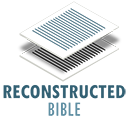Why Is This Bible Study Method So Controversial?
/If there was a Bible study method that could give you profound insights into Scripture, would you use it? Or would you let fear stop you from learning?
There is such a method called mirror-reading, but it's not without controversy. Mirror-reading assumes that Biblical authors were responding to a situation. They were only one-half of the conversation but the other half can be inferred by what they've written. And it's figuring out the other side of the conversation that has some people so afraid.
Overcome Your Fears For Greater Understanding
Hopefully most of us prefer not to be false teachers. Many aspiring teachers of the Bible have James 3:1 "you know that we who teach will be judged with greater strictness" lurking in the back of their minds. Besides the "fail fast and fail often" mantra of silicon valley, most of us probably prefer not to be wrong about things. When it comes to interpreting the Bible, many want to err on the side of caution, but error is still error whether cautious or not. One only needs to look to Matthew 25 and the parable of the golden talents to see that the cautious servant is not rewarded.
@@Biblical interpretation must not be determined by fear.@@ This is not a license to be careless but to examine the text with prudence and wisdom. So open your mind to mirror-reading and embrace the possibility of deeper understanding.
4 Reasons NOT To Fear Mirror-Reading
1. Inference is a legitimate way to reach a conclusion
Mirror-Reading is sometimes thought of as too speculative. In an ideal world, we would prefer to have clear, propositional phrases with which we can use deductive reasoning. That's not always the case, however, but sometimes we can infer things to reach a conclusion.
Circumstantial evidence is still evidence. You may not have seen the dog chew up the couch but with no other suspects and a history of mischief, we can be reasonably certain the dog did it. We can never be sure the dog wasn't framed by the cat but the circumstantial evidence is enough to produce a verdict.
Whether conscious or not, everyone makes inferences to some extent when reading the Bible. From the New Testament we can infer that there is a conflict in the early Church between Jews and Gentiles. We can even infer the reasons for the conflict. At a broad level, most students of the Bible are comfortable mirror-reading. Issues arise the more detailed one tries to mirror-read. This site is dedicated to exploring how to mirror-read as accurately and as detailed as possible.
2. You can't know the "what" without the "why"
Some may suggest that we only focus on "what" the text of Scripture says and not "why" it says it. However, sometimes we can't know the "what" without the "why". Suppose a father tells his son "Don't use a hammer in the house" when the son is 5 years old. It would be ridiculous for the son, after becoming an adult, to refuse to fix something in the house because his father said "Don't use a hammer in the house". @@The reason something is said, impacts it's meaning.@@
3. Verify!
Mirror-Reading can become a cesspool of far-fetched theories, which is why we must always do what we can to verify any mirror-reading we do. Not only is historical and cultural context important, but the context of the book that one is studying is also critical for finding evidence to support one's mirror-reading. We must not just looking for possible interpretations of the Bible but the probable.
4. Be honest
If your mirror-reading is speculative, then admit that it's speculative. Sometimes it's difficult to verify a mirror-reading and that's okay, as long as you let everyone know. Biblical scholar, John M.G. Barclay, talks about putting mirror-reading into different categories such as:
- Certain or Virtually Certain
- Highly Probable
- Probable
- Possible
- Conceivable
- Incredible

